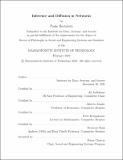Inference and Diffusion in Networks
Author(s)
Bertolotti, Paolo
DownloadThesis PDF (12.50Mb)
Advisor
Jadbabaie, Ali
Abadie, Alberto
Kempthorne, Peter
Shah, Devavrat
Terms of use
Metadata
Show full item recordAbstract
Networks provide a powerful and unified framework to study complex systems. By abstracting systems down to entities and their connections, network models provide insight into the structure and dynamics of critical systems across multiple domains. In this thesis, we study diffusion in social networks. Diffusion through networked systems corresponds to numerous consequential processes, and we focus on epidemic spread and information diffusion. We study these processes by applying and extending ideas from statistical inference. Inference, which focuses on estimation, testing, and uncertainty quantification, provides the mathematical tools to learn from data rigorously. This thesis utilizes both theory and data in order to address several real-world challenges.
In the first chapter, we study epidemic spread and consider the problem of identifying infected individuals in a population of size N. We introduce an approach that uses significantly fewer than N tests when infection prevalence is low. Our approach utilizes network structure to improve the performance of a classical approach called group testing. In the second chapter, we derive the performance of the most common form of group testing, Dorfman testing, under imperfect tests. We derive the full distribution of the number of tests needed, the number of false negatives, and the number of false positives, taking into account the conditions faced by medical practitioners. In the third chapter, we study information diffusion and introduce a statistical testing framework to identify cascades in network data. We define a test statistic that distinguishes between large, meaningful branches and the small branches formed during normal periods, and apply our statistic to identify information cascades in call detail record data. In the fourth chapter, we study the social network effects of drone strikes, focusing on information and physical diffusion around strikes. Utilizing a dataset of over 12 billion call detail records, we systematically analyze the impact of 74 U.S. drone strikes on communication and mobility in Yemen between 2010 and 2012.
Date issued
2022-02Department
Massachusetts Institute of Technology. Institute for Data, Systems, and SocietyPublisher
Massachusetts Institute of Technology